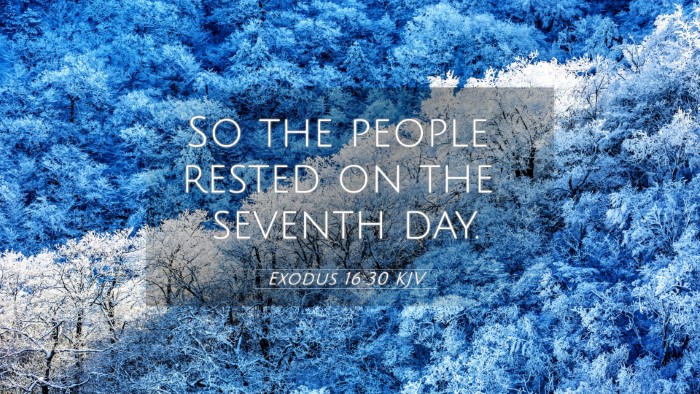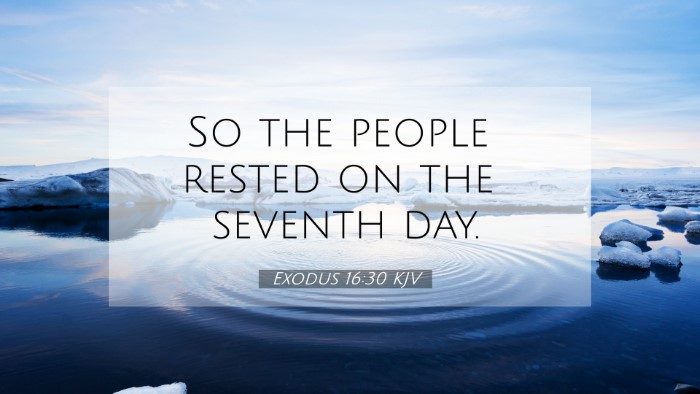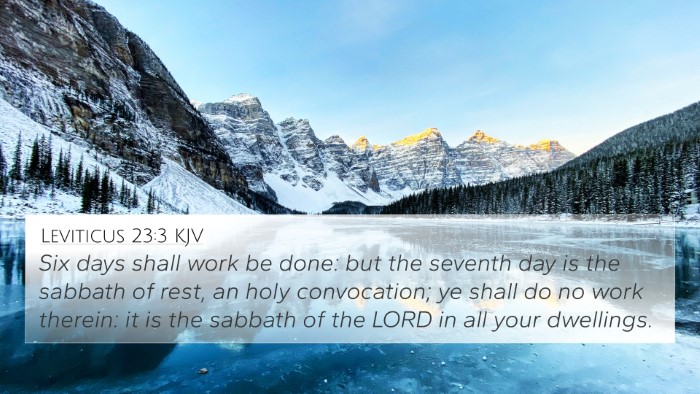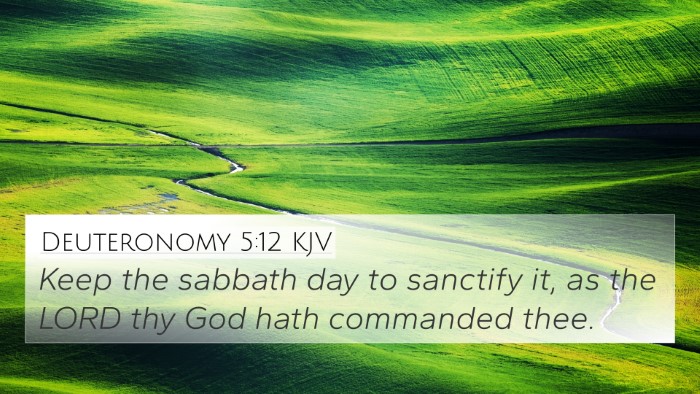Understanding Exodus 16:30
Exodus 16:30 (KJV): "So the people rested on the seventh day."
This verse marks a significant point in the Exodus narrative, encapsulating the divine instruction given to the Israelites regarding the Sabbath rest. The rationale behind this command is deeply rooted in creation theology and covenantal observance.
Summary of Insights
This verse conveys both a historical account and a theological principle. The Israelites, having experienced God's provision of manna, are instructed to honor the Sabbath, reflecting a divine rhythm established at creation. In examining this verse through the lens of various public domain commentaries, several key themes emerge:
1. The Theme of Rest
Matthew Henry emphasizes that the Sabbath rest was not merely a holiday but a holy day, intended for spiritual reflection and rejuvenation. This day of ceasing from labor indicates obedience to God’s commandments and serves as a reminder of God's creative work.
2. Reflection of God’s Provision
According to Albert Barnes, the rest on the seventh day is a direct response to the miraculous provision of manna. It teaches the Israelites that their sustenance comes from God, and they must trust Him for their needs, even when they refrain from work.
3. Connection to Creation
Adam Clarke draws parallels between the Sabbath rest in Exodus and God’s rest after the creation (Genesis 2:2-3). This highlights the importance of rest in the created order, illustrating a divine mandate that precedes the Mosaic Law.
Bible Verse Cross-References
- Genesis 2:2-3: God's rest after creation establishes the Sabbath principle.
- Exodus 20:8-11: The Fourth Commandment reiterates the importance of keeping the Sabbath holy.
- Deuteronomy 5:12-15: Reminds the Israelites of their deliverance from Egypt in the context of observing the Sabbath.
- Isaiah 58:13-14: Prophetic endorsement of the Sabbath as a day of delight in the Lord.
- Mark 2:27: Jesus teaches that the Sabbath was made for man, underscoring its intended purpose.
- Hebrews 4:9-11: The New Testament perspective on Sabbath rest as a symbol of ultimate fulfillment in Christ.
- Matthew 11:28-30: Jesus invites those burdened to find rest in Him, resonating with the spiritual aspect of the Sabbath.
Thematic Connections
This passage not only underlines the significance of rest but also invites deeper reflection on how the Sabbath serves as a sign of the covenant between God and His people. Below are thematic connections derived from cross-referencing:
- Obedience to God: The act of resting demonstrates faith and submission to God’s authority.
- Trust in Divine Provision: God’s provision of manna symbolizes spiritual nourishment.
- Rest as Worship: The Sabbath transforms personal rest into collective worship, reflecting God's holiness.
Connecting the Old and New Testaments
Examining Exodus 16:30 in light of the New Testament reveals how Jesus fulfills the Sabbath through His work. For instance:
- Matthew 12:8: Declares that Jesus is Lord of the Sabbath, affirming His divine authority.
- Colossians 2:16-17: Points out that the Sabbath and feasts were foreshadowing the substance found in Christ.
Understanding Through Comparative Analysis
Engaging in comparative Bible verse analysis offers an enriched understanding. By carefully linking Bible scriptures, one can observe the continuity and development of theological principles surrounding rest and worship throughout sacred scripture.
In particular, the emphasis placed on rest serves as a communal beacon of faith representing both God's provision and humanity's response to divine grace.
Tools for Bible Cross-Referencing
Utilizing tools for Bible cross-referencing can enhance your study. Some recommended methods include:
- Bible Concordance: Find related terms and themes across scripture.
- Digital Bible Reference Resources: Utilize apps and websites that allow for extensive cross-referencing.
- Study Guides: Employ curated study materials that focus on thematic connections within scripture.
Conclusion
Exodus 16:30 captures the essence of Sabbatical observance rooted in rest and divine provision. The thematic connections made through cross-referencing deepen our understanding of not only this verse but its place within the broader biblical narrative. Whether through inter-Biblical dialogue or thematic explorations, it is clear that the Sabbath is a foundational concept reflecting both God’s character and humanity’s need for rest.





